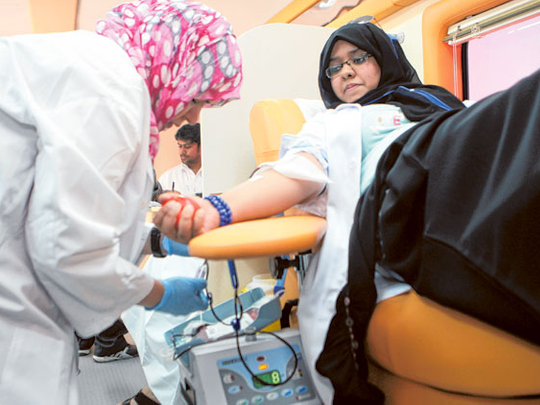
Dubai: A senior official from the Ministry of Health has sought to encourage first-time blood donors by tackling myths associated with some of the physical reactions people experience following the procedure.
Speaking to Gulf News, Dr Ameen Hussain Al Amiri, assistant undersecretary for medical practices and licensing at the ministry, and chairman of the National Blood Transfusion Committee, said that the UAE strives to educate residents on the positive experience of donating blood.
A few blood donors experience discomfort or reactions like dizziness, weakness or fainting during or immediately after donation, he said. “These are completely normal reactions. The process of venepuncture [surgical puncture of a vein for the withdrawal of blood] can be a source of uneasiness. People may experience a little bit of pain or a slight initial pinch when the needle is used. This is normal too.”
For donors who may experience bruising under the skin that could last for a couple of days, Dr Al Amiri advised application of a cold pack to the area — usually where the needle is inserted — three to four times during the first 24 hours.
He also advised prospective blood donors to have a light snack before and after donation. “Apart from avoiding air travel for at least six hours after donation, a person can go back to normal life just as someone who hasn’t given blood, enjoying the feeling that comes from knowing he or she may have saved more than three lives,” he said.
The ministry, through its blood transfusion committees and protocols, aims to increase the safety of its blood transfusion service (BTS). To ensure this, a national haemovigilance committee audits transfusion-related adverse events and reactions to prevent occurrence or recurrence.
“Any adverse reactions and unwanted events, covering all activities of the blood chain, vein-to-vein, and from donor to recipient, are reported and managed,” Dr Al Amiri said.
Stressing on the need for education to address concerns, myths and misconceptions regarding blood donation, Dr Bina Nasim, specialist registrar in internal medicine at Rashid Hospital, Dubai, told Gulf News that wrong beliefs often keep people from donating blood. “These include [the belief that] blood donation results in a loss of strength and that one can contract infections by donating blood. Some may even suffer from a fear of needles. We need to identify public perception and rectify it through awareness campaigns,” she said.












